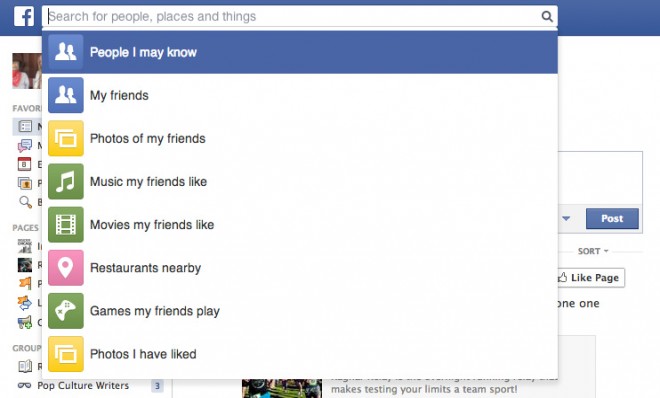Facebook's Graph Search goes public: What you need to know
Hundreds of millions of Facebook users can now search for your "Likes" and photos

A free daily email with the biggest news stories of the day – and the best features from TheWeek.com
You are now subscribed
Your newsletter sign-up was successful
This week, hundreds of millions of Facebook users will get access to a powerful new tool called Graph Search, which allows users to search through their networks to discover information about family, friends, friends of friends, and complete strangers.
Unveiled back in January when it was "in a pretty raw state," as Facebook's Lars Rasmussen told The New York Times, Graph Search will start rolling out to all American English language users starting on Monday. While Graph Search doesn't reveal any new information about users, it does make finding existing information incredibly easy.
Once Graph Search appears on your Facebook page (which can be accomplished by going here), the white search bar at the top of your screen will be replaced by a branded blue search bar.
The Week
Escape your echo chamber. Get the facts behind the news, plus analysis from multiple perspectives.

Sign up for The Week's Free Newsletters
From our morning news briefing to a weekly Good News Newsletter, get the best of The Week delivered directly to your inbox.
From our morning news briefing to a weekly Good News Newsletter, get the best of The Week delivered directly to your inbox.
All of those "Likes" clicked by users over the years have provided a thorough database of personal information for Facebook to dissect and serve back to you in the form of search results. Here is what you can expect find:
What can you search for?
Facebook likes to tout Graph Search's ability to uncover cool new movies, music, and restaurants you might enjoy. But that's not what you are going to use it for. You're going to use it to uncover facts and photos from your friends' profiles.
Say you're on the prowl. Search for "Friends who are single" and get a list of all of the eligible people in your network. Or maybe you are looking for people to unfriend. A search like this could be useful:
A free daily email with the biggest news stories of the day – and the best features from TheWeek.com

Who shows up in searches depends on how much information they have decided to share. So if someone loves cronuts and makes that information open to the public, they will show up in your search for "People who like cronuts," regardless of whether they are connected to you in any way.
You can also use Graph Search to scour photos. If you're feeling nostalgic, you can search for things like "Photos of my friends before 2008" and relive the time before the Great Recession.
You can also search for photos of yourself that people have "Liked" or photos taken by people in your network in, say, Paris, France. Like Facebook Timeline before it, Graph Search is a powerful way of rediscovering old content you might have forgotten about.
Should you be worried about your privacy?
Absolutely. Remember "Liking" beer bongs when you were in college? Probably not, but now everyone who searches for "People who like beer bongs" will.
In January, Tom Scott's blog Actual Facebook Graph Searches pointed out some of the most absurd searches, including one for "Spouses of married people who like Ashley Madison," which led to a list of married people who, for some reason, decided to "Like" a site with the motto: "Life is short. Have an affair."
Again, information that wasn't public before won't be public now. It's up to you to decide how much of your Facebook activity is for public consumption.
How can you protect yourself?
Facebook, anticipating the uproar, has created its own guide to search privacy. If you haven't gone through your privacy settings yet, now is the time to do it.
Information from posts set to "Public" in the past will be available for everyone to see. If you want to change that, you can either go back and change each post's individual setting in your Activity Log or limit the audience for all of your past posts in your privacy settings.
Or you could just permanently delete your Facebook account. But we all know that is not going to happen.
Keith Wagstaff is a staff writer at TheWeek.com covering politics and current events. He has previously written for such publications as TIME, Details, VICE, and the Village Voice.